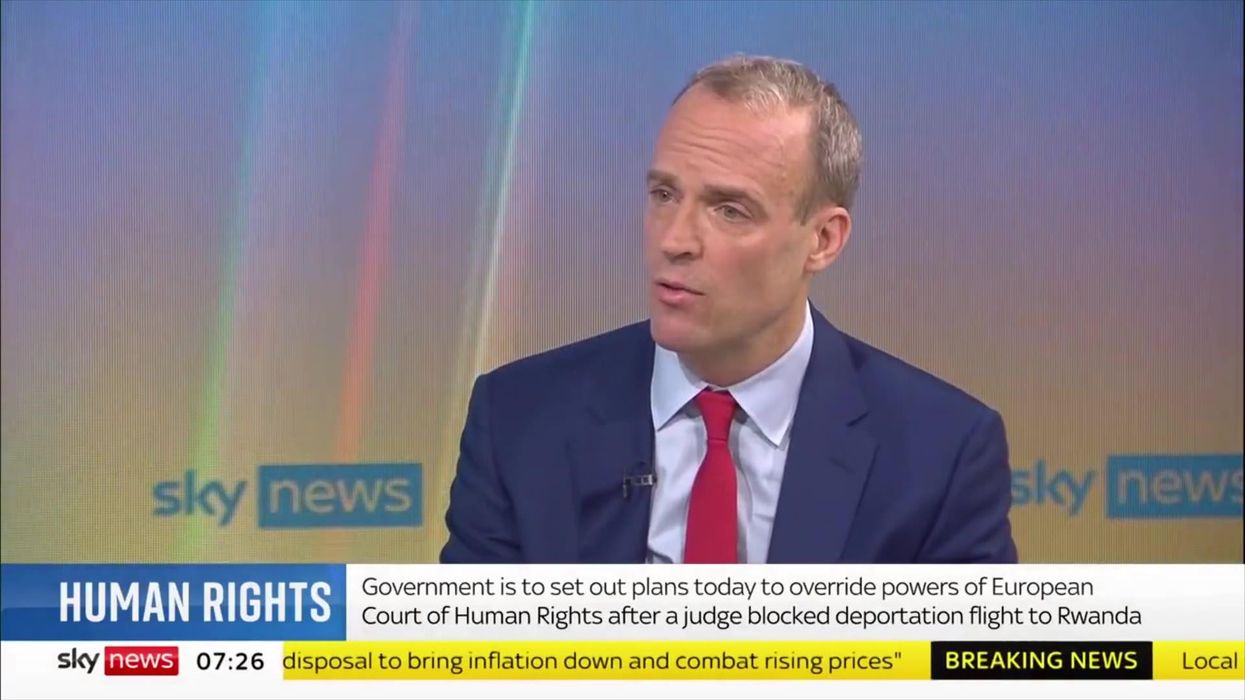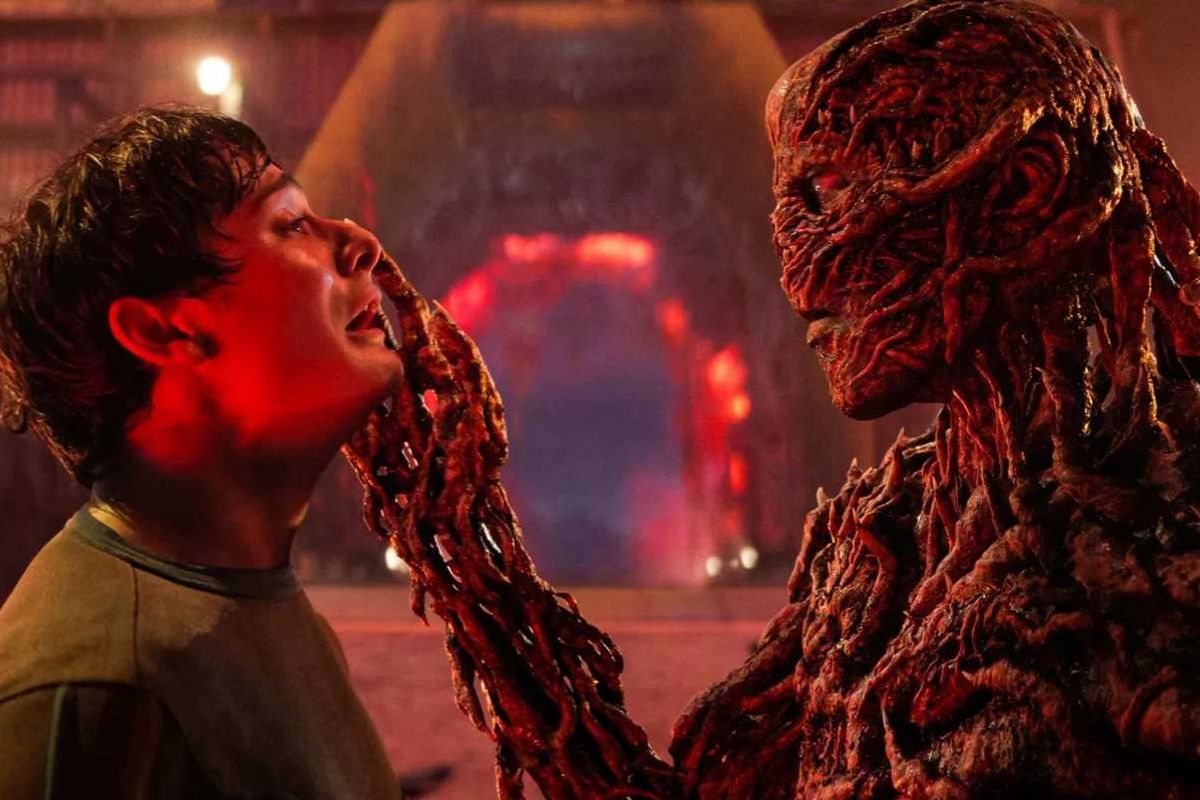Liam O'Dell
Jun 22, 2022
Related video: Dominic Raab says pushing back on EHCR rulings over Rwanda flight is 'legitimate'
Sky News
It was a just over a week ago that the UK Government was forced to cancel its first deportation flight to Rwanda, after the European Court of Human Rights (ECHR) intervened at the last minute.
Now Dominic Raab, deputy prime minister and justice secretary, has shared more details about legislation which looks to stop that from happening again – by making it so that ECHR case law “does not always need to be followed by UK courts”.
The Bill of Rights Bill – up there with ‘The Magna Carta’ as a ridiculous legal phrase which says the same thing twice – was introduced to parliament on Wednesday and looks to repeal the 1998 Human Rights Act.
That Act enshrined into UK law the European Convention on Human Rights (ECHR) – you know, the convention which covers rights such as the freedom from torture and slavery, the right to a fair trial and freedom of expression.
All pretty unimportant stuff, really.
Mr Raab told the Commons this afternoon: “Our Bill of Rights will strengthen our proud tradition of freedom, it will demarcate a clearer separation of powers, it will ensure greater respect for our democratic institutions, and it will better protect the public and restore a healthy dose of common sense to the justice system – which is essential for commanding public confidence.
Sign up to our free Indy100 weekly newsletter
“Ultimately, it will make us freer [and] it will help keep our streets safer.”
The government has also said the Bill will introduce a “permission stage” in court which means individuals will have to demonstrate they have “suffered a significant disadvantage” before their legal claim is allowed to go ahead.
On matters to do with immigration, a person would have to prove a child or another individual dependent on their care “would come to overwhelming, unavoidable harm” if they were deported.
The Ministry of Justice goes on to claim the proposed legislation will “boost freedom of the press and freedom of expression” by introducing a “stronger test for courts” before journalists are ordered to disclose their sources.
Labour’s stance
Responding to Mr Raab’s statement to MPs, shadow solicitor general Ellie Reeves MP said: “This is not a Bill of Rights, it’s a con… This Bill will take away a duty of the state to protect everyone from harm, by removing the positive obligations set out in the Human Rights Act.
“It will force victims of crime seeking justice to schlep to [the ECtHR in] Strasbourg, creating endless delays and red tape.”
Meanwhile Labour’s shadow justice secretary Steve Reed MP claimed the Bill would “[prevent] people with health problems from objecting to Do Not Resuscitate Orders [DNRs] being placed on them in hospital without their consent, block women from forcing the police to investigate cases of rape, and will stop victims of terrorist atrocities and major disasters like Hillsborough from seeing justice”.
What actual lawyers are saying
Some people who actually practise law and, as such, know the legal system perhaps better than politicians, also think a proposed Bill of Rights is a terrible idea.
Challenging Mr Raab’s claim the Bill focuses on “recognising jury trials”, anonymous legal commentator The Secret Barrister tweeted: “Correction: Dominic Raab made it one of his priorities as justice secretary to attack the right to jury trial by extending the powers of volunteer magistrates to try and sentence serious criminal cases”.
\u201cCORRECTION:\n\nDominic Raab made it one of his priorities as Justice Secretary to attack the right to jury trial by extending the powers of volunteer magistrates to try and sentence serious criminal cases.\u201d— The Secret Barrister (@The Secret Barrister) 1655897782
Another commentator, Joshua Rozenberg QC, took aim at the Bill’s desire to “[rebalance] the relationship” between UK courts, the EctHR and parliament by writing: “What is that supposed to mean? It then ‘affirms’ the existing law. What’s the point of that?”
Meanwhile, the Law Society – the representative body for solicitors – has said the Bill of Rights “signals [a] collision course with [the] rule of law” and is a “lurch backwards for British justice”.
Its president, I. Stephanie Boyce, said: “The bill will create an acceptable class of human rights abuses in the United Kingdom – by introducing a bar on claims deemed not to cause ‘significant disadvantage’.
“Authorities may begin to consider some rights violations as acceptable, because these could no longer be challenged under the Bill of Rights despite being against the law.
“Overall, the bill would grant the state greater unfettered power over the people, power which would then belong to all future governments, whatever their ideologies.”
Human rights campaign groups also oppose the move
Martha Spurrier, director of the organisation Liberty, described the government’s plans as a “power grab”.
She said: “The Human Rights Act protects everyone from injustice and abuse of power, and allows us to stand up to the government and institutions like the police or local councils when they get it wrong. We can’t let them get away with ransacking our rights like this.
“Under the government’s plans, it will become much harder for people – including disabled people and survivors of violence against women and girls – to access justice.
“This is a government that repeatedly changes the rules to suit them, and is now planning to rip up the basic rights and protections we all rely on to make themselves untouchable.
“Time and time again, we have seen that this government does not respect people’s rights and has no regard for the law.
“Human rights are universal, they should not be contingent on who the government of the day thinks deserves them.”
\u201cOur Human Rights Act places an obligation on the State to investigate unexpected deaths.\n\nThe Government's #RightsRemovalBill weakens these obligations.\n\nSign the petition to #SaveYourRights.\u201d— Liberty (@Liberty) 1655898674
Sanchita Hosali, CEO of the British Institute of Human Rights, added the UK government is “intent on ripping up the rulebook”.
“The Human Rights Act has worked well, serving its purpose to provide legal protection for everyone’s fundamental rights, here at home. In schools and hospitals, local councils and national departments, courts and care homes, people are benefitting from the protection of our human rights in everyday ways that do not grab headlines, but which do make a difference.
“Now more than ever, as we face a cost of living crisis, so many more of us will be driven into needing the safety net of human rights. Yet the Government is whipping it away in favour of a law that gifts rights dependent on whether people have the fear or favour of those in power.
“These are not the actions of a government that respects human rights, or indeed the value of law, order, and justice.”
International human rights group Amnesty International have also branded the Bill a “Rights Removal Bill”, calling it a “giant leap backwards for the rights of ordinary people”.
UK chief executive Sacha Deshmukh said: “Ripping up the Human Rights Act means the public is being stripped of its most powerful tool to challenge wrongdoing by the government and other public bodies. This is not about tinkering with rights, it’s about removing them.
“From the Hillsborough disaster, to the right to a proper Covid inquiry, to the right to challenge the way police investigate endemic violence against women, the Human Rights Act is the cornerstone of people power in this country. It’s no coincidence that the very politicians it holds to account want to see it fatally weakened.
“‘Human rights are hardwired into Northern Ireland’s peace agreement and given effect, in part, through the Human Rights Act. It’s ironic that at a time when Ministers are professing their commitment to the Good Friday Agreement, they are now threatening one of its fundamental tenets.”
Parliament’s Joint Committee on Human Rights is against reform too
A report from the group of MPs and peers this time last year concluded “the evidence we heard has led us to conclude that there is no case for changing the Human Rights Act”.
“The HRA has had an enormously positive impact on the enforcement of human rights in the UK. Whilst it is sensible that the Review’s terms of reference focused on specific issues, concentrating only on narrow legal and constitutional questions means there is a risk that proposals are made that are divorced from their wider context and will harm the enforcement of human rights,” it reads.
The Independent Human Rights Act Review (IHRAR) commissioned by the government also noted: “The vast majority of submissions received by IHRAR spoke strongly in support of the HRA. They pointed to its impact in improving public administration for individuals, through developing a human rights culture.
“Thus, the HRA was not or not just, to be viewed through the prism of a view high-profile cases or indeed with a focus on litigation at all. What happened outside the courtroom was every bit as important as the cases decided by the courts.”
Even Patrick Stewart has indicated his support of the ECHR
Patrick Stewart sketch: what has the ECHR ever done for us?www.youtube.com
The above video from The Guardian came about in 2016, back when it was Theresa May who proposed we should leave the ECHR.
The sketch – a spin on a popular Monty Python skit - remains painfully relevant.
And if they can’t even listen to Professor X, then all hope is lost.
Have your say in our news democracy. Click the upvote icon at the top of the page to help raise this article through the indy100 rankings.
Top 100
The Conversation (0)














